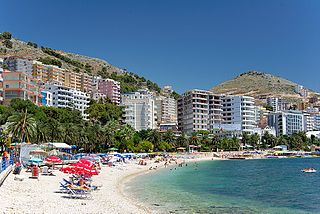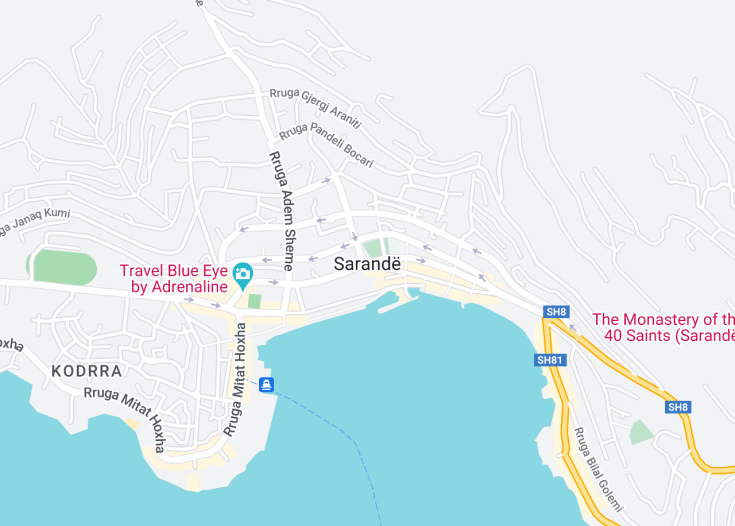Nestled on the Ionian coast of Albania, Sarandë is a stunning town synonymous with sun-drenched beaches and vibrant nightlife. It serves as an ideal gateway to the ancient ruins of Butrint, a UNESCO World Heritage site. The town’s promenade, lined with palm trees and bustling with cafes and shops, invites leisurely strolls with sweeping sea views. Sarandë’s proximity to the Greek island of Corfu adds an international flair to its already rich cultural tapestry, making it a compelling destination for travelers seeking both relaxation and adventure.
For an unforgettable experience, visit Sarandë during the off-season. Enjoy fewer crowds, milder weather, and the same captivating charm.
Don’t miss out on a boat tour of the nearby Ksamil Islands, where the crystal-clear waters and secluded beaches create a perfect day trip.
Top things to do & see in Sarandë
Select the following sights and activities to discover best tickets and tours available in Sarandë.
Sarandë: A Gem on the Albanian Riviera
| Country | Albania |
| Time in Sarandë | GMT+1 |
| Language spoken | Albanian |
| Population | 17,233 (Source: Statistical Office of Albania, 2021) |
| Currency | Albanian Lek (ALLₚ) |
| Airports |
|
Sarandë, nestled on the southern coast of Albania, along the Ionian Sea, is renowned for its stunning deep blue waters and vibrant cultural scene. This city, which once was a sleepy fishing village, has transformed into one of the country’s bustling tourist hotspots, charisma and history woven deep into its modern fabric.
Historically, Sarandë has been inhabited since ancient times, often serving as a strategic port in the region. It is situated opposite the Greek island of Corfu, acting as a gateway between Albania and Greece, which has enriched its cultural tapestry. The city’s original name, Onchesmos, reflects its ancient Greek influence, however, over time, it has been baptized anew as “Sarandë,” referring to an early Christian monastery dedicated to the Forty Saints.
Today, Sarandë is a hub of activity, particularly well-loved by visitors during the warm summer months. Its promenade is lined with palm trees, offering locals and tourists alike a picturesque path to explore the waterfront restaurants, shops, and bars. Nearby, the remains of a 5th-century synagogue represent one of the earliest Jewish communities in the Balkans. The synthesis of old and new, indigenous and foreign, renders Sarandë an intriguing place to explore.
The city is also a perfect base for exploring the natural and historical riches of southern Albania. The UNESCO World Heritage site of Butrint, just a half-hour’s drive from the city, provides a window into the past with its well-preserved ruins dating from Hellenistic to Ottoman times. The less frequented beaches, like Ksamil to the south, provide secluded sandy escapes for those looking to break away from the bustling city beaches.
As tourism continues to soar, Sarandë is expanding rapidly, offering increased amenities and services for international travelers. Whether it’s exploring ancient ruins, enjoying local seafood cuisine or simply taking in the vibrant nightlife, Sarandë offers a distinct blend of Albanian heritage and modernity, making it a compelling destination for visitors yearning for Mediterranean charm spiced with Balkan hospitality.
Where is Sarandë?
Sarandë is located in southern Albania, along the Ionian Sea coast, facing the Greek island of Corfu.
Distances:
| Route | Distance by car | Time by car |
|---|---|---|
| Tirana to Sarandë | 180 miles / 290 km | Approximately 4 hours 30 minutes |
| Vlorë to Sarandë | 75 miles / 120 km | Approximately 2 hours 15 minutes |
What is Sarandë famous for?
Sarandë is famous for its stunning coastal scenery, rich historical sites like the ancient city of Butrint, and its lively atmosphere during the summer tourism season.
History
Prehistory to Roman Occupation
The area that is now Sarandë has been inhabited since prehistoric times, evidenced by archaeological findings that include ancient tools and remains. During antiquity, it was part of the realm occupied by the Chaonians, an ancient Greek tribe. The strategic location along the Ionian coast facilitated its growth as a center for trade and communication. With the expansion of the Roman Empire, Sarandë became an important outpost, serving as a critical juncture in trade routes across the Adriatic.
Byzantine Era to Ottoman Rule (4th century – 1912)
Following the split of the Roman Empire, Sarandë was under Byzantine control, facing multiple invasions from various forces including the Goths and the Normans. It was during this period that the town was fortified with walls and the name changed from Onchesmos to Saranda, derived from an early Christian monastery dedicated to Saint Saranda (Forty Saints). The Ottoman Turks took control in the early 15th century and Sarandë became a minor port within the vast Ottoman Empire, experiencing a mix of development and neglect through the centuries.
20th Century Forward
The Balkan Wars and subsequent World Wars brought changes in sovereignty and significant hardship to the residents of Sarandë. It became part of Albania in 1912 after the Balkan Wars. During World War II, it was occupied by Italy and Germany before being liberated. The communist regime after the war isolated Sarandë from much of the international community, but its picturesque landscape continued to attract domestic tourists. Following Albania’s shift from communism in 1991, Sarandë has embraced open market reforms and tourism has rapidly expanded, transforming it into a vibrant seaside destination.
Visit Sarandë
What to see and do in Sarandë
Explore the vibrant culture and stunning natural landscapes of Sarandë. Begin your adventure at the enchanting ruins of the ancient city of Butrint, a UNESCO World Heritage Site that offers a captivating glimpse into the past. Stroll along Sarandë’s bustling promenade, lined with cafes and shops, providing an ideal setting for a leisurely evening. For beach enthusiasts, the pristine shores of Ksamil Beach await, known for its crystal-clear waters and scenic beauty. Don’t miss a visit to the Blue Eye (Syri i Kaltër), a natural spring known for its deep, vibrant azure blue water.
- Explore Butrint National Park.
- Walk the Sarandë Promenade.
- Relax at Ksamil Beach.
- Visit the Blue Eye Spring.
Annual Events
Experience the rich cultural tapestry of Sarandë through its numerous events. The Summer Festival, held in July, is a highlight, featuring traditional music, dance, and delicious local cuisine. Wine lovers will appreciate the Sarandë Wine Festival in August, which showcases the best of local vineyards. For art enthusiasts, the Sarandë International Arts Festival in September offers a platform for artists from around the world to exhibit their work.
Best time to visit Sarandë
The ideal time to visit Sarandë is from late spring to early autumn, specifically from May to September, when the weather is warm and sunny, perfect for beach activities and exploring the outdoors.
Is Sarandë worth visiting?
Definitely, Sarandë is worth a visit for anyone looking to explore a blend of historical richness and contemporary charm. Its archaeological sites like Butrint offer a window into the ancient past while its vibrant beach scene provides relaxation and fun. The unique blend of cultural heritage, natural beauty, and friendly locals makes Sarandë an irresistible destination on the Albanian Riviera.
What are the best beaches to visit in Sarandë, Albania?
- Ksamil Beach: Famous for its crystal-clear waters and fine sand, Ksamil Beach is a favorite among tourists. It consists of several small islands that you can swim or boat to, providing a unique experience.
- Mirror Beach (Pasqyra Beach): Known for its beautiful reflective sand and turquoise waters, Mirror Beach is a secluded paradise ideal for those looking for a quiet spot to relax.
- Santa Quaranta Beach: This beach is part of a beach resort, offering excellent amenities such as bars, restaurants, and sunbeds. It’s perfect for families and individuals who appreciate beachside comfort.
These beaches offer a combination of natural beauty and amenities, making them perfect for a day under the sun.
What local foods should I try while in Sarandë?
- Seafood: As a coastal town, fresh seafood is abundant. Don’t miss the grilled fish, squid, or octopus, often served with local olive oil and lemon.
- Tavë kosi (Baked lamb and yogurt): This traditional Albanian dish combines lamb with rice, eggs, and yogurt, baked to create a uniquely comforting dish.
- Byrek: This savory pie made with layers of filo pastry can be filled with cheese, spinach, or meat and is perfect for a quick snack or light meal.
Sampling these dishes will give you a real taste of the local culture and its culinary traditions.
Are there any nature reserves near Sarandë to explore?
- Butrint National Park: A UNESCO World Heritage site, this park is not only historically significant with ancient ruins but also features wetlands, salt marshes, and islands that are home to diverse flora and fauna.
- Blue Eye (Syri i Kaltër): This natural water spring features deep, vibrant blue waters surrounded by a lush forest, offering a cool escape and opportunities for hiking and picnics.
These reserves provide an excellent opportunity for nature lovers to explore and enjoy the serene landscapes near Sarandë.
What cultural sites should I visit in Sarandë?
- The Ancient City of Butrint: A UNESCO World Heritage Site, Butrint includes ruins from various periods including Hellenistic, Roman, Byzantine, and Venetian times, offering a glimpse into the area’s layered history.
- Lëkurësi Castle: Located on a hill overlooking Sarandë, this castle offers panoramic views of the Ionian Sea and is a perfect spot for sunset views. It also hosts a restaurant where you can enjoy traditional Albanian cuisine.
- Monastery of the Forty Saints: Although in ruins, this historical site is significant for its historical and religious context and offers insights into the Byzantine era of the region.
Visiting these sites will enrich your understanding of Sarandë’s historical and cultural background.
Can I engage in water sports in Sarandë?
- Scuba Diving: Explore underwater treasures in the clear waters of the Ionian Sea, including diverse marine life and shipwrecks.
- Jet Skiing and Windsurfing: With its favorable winds, Sarandë is an excellent place for windsurfing, and jet skiing is popular for those looking for a speed thrill.
- Kayaking and Paddle Boarding: For a more relaxed experience, kayaking and paddle boarding are great ways to explore the coastline at your own pace.
There are several rental services along the beach that offer equipment and lessons, making it easy for beginners and enthusiasts alike to enjoy these activities.
What are common customs I should be aware of when visiting Sarandë?
- Greeting: A handshake is common when meeting someone for the first time. Among friends, a kiss on each cheek is typical.
- Invitations: Albanians are known for their hospitality. If invited to someone’s home, bringing a small gift like flowers or a bottle of wine is appreciated.
- Coffee Culture: Coffee is an integral part of Albanian social life. Joining someone for a coffee signifies friendship and respect.
Respecting these customs will help you foster good relationships and enhance your travel experience in Sarandë.
What languages are commonly spoken in Sarandë?
What transportation options are available in Sarandë?
- Taxis and Rental Cars: Taxis are readily available and can be hailed on the street. For more flexibility, consider renting a car.
- Buses: Public buses run regularly between Sarandë and major cities like Tirana, and also to nearby attractions such as Butrint and Ksamil.
- Bicycles and Scooters: Rental shops offer bicycles and scooters, which are ideal for short distances within the city or exploring the coastline at your leisure.
These options provide convenient and flexible ways to explore Sarandë and its beautiful surroundings.









